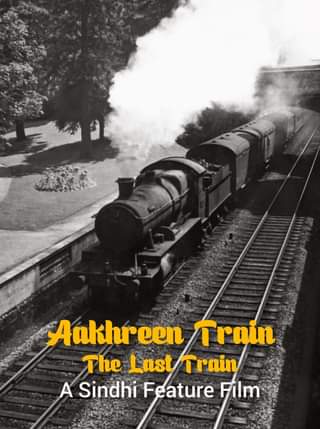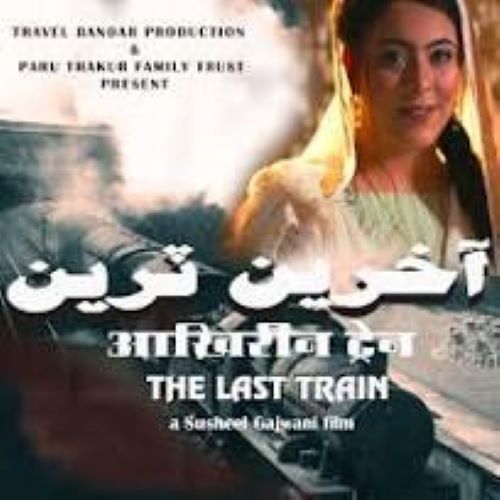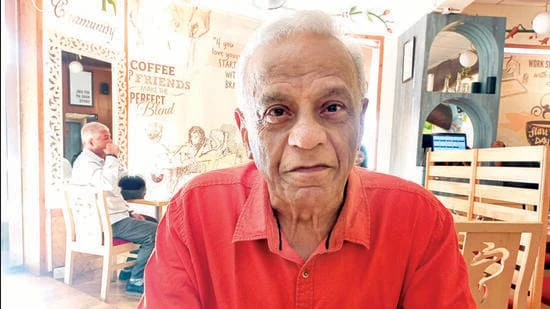
Aakhreen Train – The Last Train, a Sindhi film about two Hindu-Muslim lovers caught in the turmoil of Partition, based on well-known writer Thakur Chawla’s short story, is directed by Susheel Gajwani
By Jyoti Punwani
Mumbai
Aakhreen Train – The Last Train, a Sindhi film about two Hindu-Muslim lovers caught in the turmoil of Partition which does not demonize Pakistan or its people, is currently running to packed houses.
Based on well-known writer Thakur Chawla’s short story, the film is directed by Susheel Gajwani, and is his first Sindhi venture.
 For young Sindhis, whose knowledge of Partition comes from their grandparents’ memories, the film is a discovery of their roots. That’s the aim with which it was made, says Gajwani. “None of the films or TV shows made about Partition have dealt with Sindhi refugees,” he laments.
For young Sindhis, whose knowledge of Partition comes from their grandparents’ memories, the film is a discovery of their roots. That’s the aim with which it was made, says Gajwani. “None of the films or TV shows made about Partition have dealt with Sindhi refugees,” he laments.
Born and brought up in Kolhapur, it seemed natural for Gajwani to start his film career with Marathi films. Of the 13 films he’s directed so far, 11 have been Marathi films. Marathi comes as easily to him as his mother tongue. Among the most notable of his films is `Mulgi Zhaali Ho’, based on the famous street play by the same name written in 1983 by Jyoti Mhapsekar. Made in 1985, the film starred top artistes such as Dr. Shreeram Lagoo and Suhas Joshi. He also directed Nilu Phule in `Raakhandaar’.
Gajwani’s first film in his mother tongue was born out of a webinar in memory of Thakur Chawla, where the director read out ‘Aakhreen Train’. His rendition so moved Chawla’s daughter, Barkha Khushalani, that it was decided to make a film based on the story. Barkha wrote the dialogues and lyrics and co-authored the script with Gajwani, while the famous Mahesh Chander was roped in for the music.

Born and brought up in Kolhapur, it seemed natural for Gajwani to start his film career with Marathi films. Of the 13 films he’s directed so far, 11 have been Marathi films. Marathi comes as easily to him as his mother tongue
In a refreshing surprise, the film shows Pakistani Muslims as warm, affectionate and free of religious prejudice. “Few communities affected by Partition have had as good a rapport between Hindus and Muslims as have Sindhis,” explains Gajwani. “We worship our greatest poet Shah Abdul Latif, as well as Sufi saints Sachal Sarmast and Sami. During Partition, Sindhi Hindus didn’t face violence from Sindhi Muslims; it was the influx of Muslim refugees from Uttar Pradesh into Sindh that forced them to leave.”
The intention was to show the characters primarily as human beings, says Gajwani. “There are enough people stereotyping Pakistanis,” he adds wryly.
The film traverses the rural Sindh of those days, giving viewers a glimpse of a way of life that few Sindhis in India have experienced. A song in the film also provides an overview of the community’s achievements after Partition, including stalwarts like educationist Sadhu T L Vaswani; teenaged martyr of the 1942 movement Hemu Kalani; the late filmstar Sadhana; and BJP leader LK Advani. Acharya Kripalani, a stalwart of the freedom movement, is a notable omission.
Like most Sindhis born in the decade after Partition, Gajwani faced ridicule as a refugee and as a Sindhi from neighbors and classmates. He hopes the film will make the community, which was suddenly cut off from its roots, aware of its rich culture. “We Sindhis lost out by not having a state of our own,” he says.
Connecting Sindhis with their culture is something of a passion with the 68-year-old filmmaker. He runs ‘Roots, The Time Travelers’, a forum which holds readings of Sindhi literature both in the original and in translation.
While his experience with Marathi films prepared Gajwani for the difficulties in releasing a Sindhi film, the Chawla family which produced Aakhreen Train hit upon a novel way to involve the community. Theatres were booked through the network of Sindhi panchayats found across the country, ensuring that viewers, young and old, queue up to buy tickets.
Read: Indus Echoes – Pakistan’s First International Sindhi Language Feature Film near completion
______________________
[…] Read: A Sindhi film on Partition breaks the mould, wows audiences […]